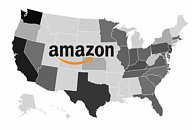Raevenlord
News Editor
- Joined
- Aug 12, 2016
- Messages
- 3,755 (1.18/day)
- Location
- Portugal
| System Name | The Ryzening |
|---|---|
| Processor | AMD Ryzen 9 5900X |
| Motherboard | MSI X570 MAG TOMAHAWK |
| Cooling | Lian Li Galahad 360mm AIO |
| Memory | 32 GB G.Skill Trident Z F4-3733 (4x 8 GB) |
| Video Card(s) | Gigabyte RTX 3070 Ti |
| Storage | Boot: Transcend MTE220S 2TB, Kintson A2000 1TB, Seagate Firewolf Pro 14 TB |
| Display(s) | Acer Nitro VG270UP (1440p 144 Hz IPS) |
| Case | Lian Li O11DX Dynamic White |
| Audio Device(s) | iFi Audio Zen DAC |
| Power Supply | Seasonic Focus+ 750 W |
| Mouse | Cooler Master Masterkeys Lite L |
| Keyboard | Cooler Master Masterkeys Lite L |
| Software | Windows 10 x64 |
A Supreme Court decision last Thursday may be just what the doctor ordered for states' ability to collect taxes on online sales from a much wider variety of businesses. The decision, passed with 5-4 votes from the Justices involved, overrules previous understandings regarding the physical presence rule: essentially, that a business was only forced to collect sales tax and send it to the State it's operating if it had some sort of physical presence (be it warehouses or some such) in that particular state. If not, taxes were still due - but shoppers had to take the initiative of delivering their taxable amount to the state. That, naturally, very rarely happened, which led to reported billion dollar losses in tax revenue for a variety of US states.
Now, states have essentially been given the green light to pass laws requiring out-of-state sellers to collect the state's sales tax from customers and send it to the state. More than a dozen states have already adopted such laws even ahead of the court's decision, confident in the decision's direction, said state tax policy expert Joseph Crosby.

This move, however helpful it is for states to regain (up to now) lost revenue, will likely be a slow death strangle for small online businesses. These smaller businesses with an online only presence usually skirted tax fees on their products, bringing lower prices to consumers - allowing for actual competition with bigger chains that are better able to leverage economics of scale. Now, these find themselves in a position of having to charge sales tax on every product they sell, irrespective of inside their home state or not. Now, everyone is playing on an even tax field, since big corporations (like Amazon, which has a physical presence in every state and thus already collected tax) and small businesses alike compete on the same field. But this does mean that the smaller upstarts will have more troubling times ahead, and online services like Kickstarter might find themselves taken aback immensely. Not to say anything about shoppers, who now will have no way to resort to lower prices due to no tax being applied to their products.


View at TechPowerUp Main Site
Now, states have essentially been given the green light to pass laws requiring out-of-state sellers to collect the state's sales tax from customers and send it to the state. More than a dozen states have already adopted such laws even ahead of the court's decision, confident in the decision's direction, said state tax policy expert Joseph Crosby.

This move, however helpful it is for states to regain (up to now) lost revenue, will likely be a slow death strangle for small online businesses. These smaller businesses with an online only presence usually skirted tax fees on their products, bringing lower prices to consumers - allowing for actual competition with bigger chains that are better able to leverage economics of scale. Now, these find themselves in a position of having to charge sales tax on every product they sell, irrespective of inside their home state or not. Now, everyone is playing on an even tax field, since big corporations (like Amazon, which has a physical presence in every state and thus already collected tax) and small businesses alike compete on the same field. But this does mean that the smaller upstarts will have more troubling times ahead, and online services like Kickstarter might find themselves taken aback immensely. Not to say anything about shoppers, who now will have no way to resort to lower prices due to no tax being applied to their products.


View at TechPowerUp Main Site







